
Karen Lillis
"I need to send my love. I need to send my love. I need my love to wrap around my alphabet and become words and then I need to send them away. I need to send my love far away. I need to send words away. The farther away I send my words the better it is when they come back. The farther away I send my love the better it is when it comes back" from The Second Elizabeth
How often do we focus on the words we speak? There are moments, minutes, hours, chunks of hours that we may go without speaking a thoughtful word. So many words are exchanged without awareness or thought. You are asked a question, a question that has been asked of you thousands of times, and the answer just rolls outs. Yet, when we take time to focus on language, to fully and thoroughly study each word we use, the results can be magical.
Karen Lillis runs a small press called Words Like Kudzu, and herself writes in a deliberate and focused way. In her latest novel, The Second Elizabeth (Six Gallery Press, Jan. 09), Karen uses an elaborate form of repetition to examine her characters and, more centrally, language. The poetic way she writes unfolds, folds up, and unfolds again. She puts down a simple phrase, "Elizabeth is my middle name.", and then begins to build and roll through thoughts and words until the idea is done. It is a captivating look at how language can be used.
Recently, Karen was kind enough to answer a few of my questions.
Orange Alert (OA): You latest novel, The Second Elizabeth, is being published by Six Gallery Press this January. What can you tell us about The Second Elizabeth?
Karen Lillis (KL): The Second Elizabeth is set in a hot, lush, kudzu-overgrown summer in Charlottesville, Virginia. "Elizabeth" has returned to the city of an unnamed past tragedy, when she meets a fearless and rebellious young woman, Beth, who blows her mind--Beth manages to shake her inner world and the very definitions she lives by.
On one level, the book is straight-up poetry--a meditation on the name Elizabeth, on other place and people names I've been surrounded by, on nature looming larger than what's man-made, and on language and who controls it. On another level, the book is very much a story--about the unique Beth and about Elizabeth's need for a guide--for someone who's already figured out how to creatively disobey and stay vital and intact in the process. This is a theme I used in an earlier novel, I, Scorpion,--this punk character called "the girl" comes and rescues the protagonist from her soul-killing office job. I find a level of violence in these characters--Beth or "the girl." Because the world around them does not reflect their whole reality, then by virtue of being fearlessly themselves, they cause a violent ripple-effect. They become a sort of Kali figure for me--creative and destructive at the same time.
The book blurs clear distinctions between poetry and prose, between prose-poem and novel, between autobiography and fiction. That said, I aimed for a very readable book--I always aim to communicate, even if I'm experimenting.
OA: The way Elizabeth is written really grabbed me and drew me into the language and repetition. Can you talk a little about this style of writing, and how you came to utilize it in this way?
KL: I was really influenced by some European novellas from the 1980s and 90s that were very minimal, almost claustrophobic--written from a deeply internal perspective. In other phases, I was interested in a sort of Kathy-Acker style maximalism, but for The Second Elizabeth, I adopted a language that used much simpler words, and simpler sentences. The sentences and their slightly-altered repetition have a tunneling effect, I think--I was aiming to convey pretty much one emotion, sorrow or grief.
The author Helene Cixous talks about a writer and her "magic words"--words that contain a dense, poetic power for the writer. In The Second Elizabeth, I hopscotched from one magic word to another--and they were all tangled up in my mind with Virginia and Charlottesville. So, this was the sort of poetic back-bone of the book. When I was writing, I let those words guide me until they exhausted themselves. Reading the book out loud to myself as I went along was another guide--it had to make sound sense.
The motivation for this book was to tell the trauma that's at the heart of it, but "that story" never actually gets told. I had worked with this story in various forms prior to this novel, and by the time I wrote The Second Elizabeth I realized it was more important to convey the emotional story than to actually tell the story. If Elizabeth tells the story in short form, it might get disputed, it could get taken away from her. To tell the story in long, winding form is to enchant the reader into believing it. I think it's an old storyteller's trick.
OA: What has your experience been like with Six Gallery Press?
KL: My experience has been largely with the acquisitions editor, Che Elias. Che is a really interesting Pittsburgh figure--for starters, he grew up in a small town in West Virginia, and Pittsburgh is his New York City--the cosmopolitan place he fled to after high school. I met Che soon after I moved to Pittsburgh: I had taken on an assignment to write about the small press scene in Pittsburgh, and Che was the first person I interviewed. He's an experimental writer, he's taught himself about the contemporary small press scene and experimental fiction without straying far from Pittsburgh; he reads constantly and he also devours about 20 films per week. He's surrounded himself with the poets in Pittsburgh who are unaffiliated with the colleges or universities here, which is sort of a feat in itself. Che was enthusiastic about wanting to publish The Second Elizabeth and I happily accepted. Dana Killmeyer at Six Gallery was great to work with--she typeset The Second Elizabeth and was very patient with corrections I requested.
OA: You also run your own independent press called Words Like Kudzu. What led to the decision to start a press, and what has been your biggest challenge so far?
KL: What led to the decision? Definitely impatience. I started the press by self-publishing my first novel, I, Scorpion, because I really believed in it and was too impatient to wait and shop it around. I was young and determined. I finished writing the book, edited it, Xeroxed 300 copies and promptly went on a cross-country, 5-week reading tour courtesy of Greyhound and my friend's couches. As for the challenges, money has been the biggest. How to fund something that's not going to make money? In order to make money off a small press, you have to commit to something beyond what a Sunday publisher can commit to--I would have to go from being a micro press to being a larger small press. Even then, it's a long time before you see returns on your sales, stores don't pay you up front. So, then the money challenge becomes a prioritizing issue. If I'm working full time to pay my expenses BEFORE the press, and I'm a writer before I'm a publisher, and I have other life responsibilities....my own writing tends to get top billing when I have or make free time.
OA: I recently saw Words Like Kudzu described as a SMALL small press. How do you feel about the phrase "small press"? What are your thoughts on the current state of the independent press in general?
KL: I like the phrase "small press." I guess as a term, it's phasing out because people are putting the emphasis on who is funding the venture, rather than on the size of the print run--? I don't mind this type of shift, but if it's because the phrase "small press" seems diminutive, then I think that's silly. I have no problem with the idea that something is small, the adjective has reverberations for me more of "vulnerable" and less of "unimportant." I think we're living in an age that values bullies and bullying, and that vulnerability is an underrated value. So, for me the term "small press" is great. It seems very much in keeping with the spirit of poetry itself--poetry is this incredibly fragile, ephemeral, vulnerable thing that, when a reader connects with a poem or a poet, has an enormous impact. To me, Independent Press is more of a business description and Small Press is more of a literary description.
As far as the current state, I am still having my mind blown by how many micro presses are out there! I used to work at St Mark's Bookshop, and I understood the small press through that lens--through their buying selections. I got introduced to the great small presses like Dalkey Archive, Sun and Moon, New Directions, and Soft Skull, or journals like Fence or Yeti, and local zines and chapbooks that came into the store. Now I live "out here" in Pittsburgh and I see things through Myspace and the internet--it's less tangible to me, so I'm a bit overwhelmed. So, I'm getting interested in the small press organizations that try to make some sense of it for the audience--through distribution, online catalogs, book fairs, reading series, or other ways of showcasing--like your blog. I'm very excited by organizations like Microcosm Publishing, the Woodland Pattern Book Center, Quimby's, the Chicago Underground Library, the Small Press Exchange, The New York Center for Independent Publishing, CLMP, SPD, and the many zine libraries, infoshops and indie bookstores that support the small press. They seem to offer the small press scene more of a sense of staying power and continuity: Let the presses be as erratic as they choose to be, but let the small press centers collect them and make sense of them, too.
OA: What's next for Karen Lillis?
KL: My current project is collaborating with the poet, Richard Leck. We are writing his autobiography, largely about growing up in Jersey City during the 1930s, 40s, and 50s. He tells me stories and my job is to put a shape to the many impressionistic details he gives me. His details are so strange to the modern ear--so specific to a time and place, and possibly to Leck's storytelling, that they let me imagine the final book as a dense prose poem. I'm also writing the book in a rhythm inspired by Leck's spoken cadence. So in form, the book has a lot of overlap with The Second Elizabeth.
Otherwise, I have a number of book projects I'm trying to finish and/or publish--The Greenpoint Trilogy (short stories), The War in Brooklyn (a novella/ a love story), and a New York prose-poem I'm being more secretive about.
On WLK, I have several writers' books I'd love to publish, but it will depend on funding.
You can listen to excerpt from The Second Elizabeth here.
Bonus Questions:
OA: Coffee? If yes, where can you find the best cup in your area?
KL: No, but I'm a year-round hot-tea drinker (herbal or green). I actively boycott Starbucks and other chains. In Pittsburgh, there are many great indie cafes to choose from: My favorites are Tango Cafe for the international community, Kiva Han for the student/bohemian vibe, Crazy Mocha in Bloomfield for the constant parade of creative people I know or would want to meet, and The Beehive for the romantic punk atmosphere.
OA: What type of music do you enjoy and who are a few of your favorites?
KL: I like lots of different kinds of music, and most of them happened between 1970 and 1989. My favorites change constantly, but some steadies are Carole King, Patti Smith, and Laura Nyro. Newer music that thrills me is Devon Sproule and the rest of the Charlottesville Acoustic Mafia, as well as The Swell Season. I recently rediscovered Fuzzbox and The Go-go's.
For more information on Karen Lillis please visit her website or the Words Like Kudzu site.
"I need to send my love. I need to send my love. I need my love to wrap around my alphabet and become words and then I need to send them away. I need to send my love far away. I need to send words away. The farther away I send my words the better it is when they come back. The farther away I send my love the better it is when it comes back" from The Second Elizabeth
How often do we focus on the words we speak? There are moments, minutes, hours, chunks of hours that we may go without speaking a thoughtful word. So many words are exchanged without awareness or thought. You are asked a question, a question that has been asked of you thousands of times, and the answer just rolls outs. Yet, when we take time to focus on language, to fully and thoroughly study each word we use, the results can be magical.
Karen Lillis runs a small press called Words Like Kudzu, and herself writes in a deliberate and focused way. In her latest novel, The Second Elizabeth (Six Gallery Press, Jan. 09), Karen uses an elaborate form of repetition to examine her characters and, more centrally, language. The poetic way she writes unfolds, folds up, and unfolds again. She puts down a simple phrase, "Elizabeth is my middle name.", and then begins to build and roll through thoughts and words until the idea is done. It is a captivating look at how language can be used.
Recently, Karen was kind enough to answer a few of my questions.
Orange Alert (OA): You latest novel, The Second Elizabeth, is being published by Six Gallery Press this January. What can you tell us about The Second Elizabeth?
Karen Lillis (KL): The Second Elizabeth is set in a hot, lush, kudzu-overgrown summer in Charlottesville, Virginia. "Elizabeth" has returned to the city of an unnamed past tragedy, when she meets a fearless and rebellious young woman, Beth, who blows her mind--Beth manages to shake her inner world and the very definitions she lives by.
On one level, the book is straight-up poetry--a meditation on the name Elizabeth, on other place and people names I've been surrounded by, on nature looming larger than what's man-made, and on language and who controls it. On another level, the book is very much a story--about the unique Beth and about Elizabeth's need for a guide--for someone who's already figured out how to creatively disobey and stay vital and intact in the process. This is a theme I used in an earlier novel, I, Scorpion,--this punk character called "the girl" comes and rescues the protagonist from her soul-killing office job. I find a level of violence in these characters--Beth or "the girl." Because the world around them does not reflect their whole reality, then by virtue of being fearlessly themselves, they cause a violent ripple-effect. They become a sort of Kali figure for me--creative and destructive at the same time.
The book blurs clear distinctions between poetry and prose, between prose-poem and novel, between autobiography and fiction. That said, I aimed for a very readable book--I always aim to communicate, even if I'm experimenting.
OA: The way Elizabeth is written really grabbed me and drew me into the language and repetition. Can you talk a little about this style of writing, and how you came to utilize it in this way?
KL: I was really influenced by some European novellas from the 1980s and 90s that were very minimal, almost claustrophobic--written from a deeply internal perspective. In other phases, I was interested in a sort of Kathy-Acker style maximalism, but for The Second Elizabeth, I adopted a language that used much simpler words, and simpler sentences. The sentences and their slightly-altered repetition have a tunneling effect, I think--I was aiming to convey pretty much one emotion, sorrow or grief.
The author Helene Cixous talks about a writer and her "magic words"--words that contain a dense, poetic power for the writer. In The Second Elizabeth, I hopscotched from one magic word to another--and they were all tangled up in my mind with Virginia and Charlottesville. So, this was the sort of poetic back-bone of the book. When I was writing, I let those words guide me until they exhausted themselves. Reading the book out loud to myself as I went along was another guide--it had to make sound sense.
The motivation for this book was to tell the trauma that's at the heart of it, but "that story" never actually gets told. I had worked with this story in various forms prior to this novel, and by the time I wrote The Second Elizabeth I realized it was more important to convey the emotional story than to actually tell the story. If Elizabeth tells the story in short form, it might get disputed, it could get taken away from her. To tell the story in long, winding form is to enchant the reader into believing it. I think it's an old storyteller's trick.
OA: What has your experience been like with Six Gallery Press?
KL: My experience has been largely with the acquisitions editor, Che Elias. Che is a really interesting Pittsburgh figure--for starters, he grew up in a small town in West Virginia, and Pittsburgh is his New York City--the cosmopolitan place he fled to after high school. I met Che soon after I moved to Pittsburgh: I had taken on an assignment to write about the small press scene in Pittsburgh, and Che was the first person I interviewed. He's an experimental writer, he's taught himself about the contemporary small press scene and experimental fiction without straying far from Pittsburgh; he reads constantly and he also devours about 20 films per week. He's surrounded himself with the poets in Pittsburgh who are unaffiliated with the colleges or universities here, which is sort of a feat in itself. Che was enthusiastic about wanting to publish The Second Elizabeth and I happily accepted. Dana Killmeyer at Six Gallery was great to work with--she typeset The Second Elizabeth and was very patient with corrections I requested.
OA: You also run your own independent press called Words Like Kudzu. What led to the decision to start a press, and what has been your biggest challenge so far?
KL: What led to the decision? Definitely impatience. I started the press by self-publishing my first novel, I, Scorpion, because I really believed in it and was too impatient to wait and shop it around. I was young and determined. I finished writing the book, edited it, Xeroxed 300 copies and promptly went on a cross-country, 5-week reading tour courtesy of Greyhound and my friend's couches. As for the challenges, money has been the biggest. How to fund something that's not going to make money? In order to make money off a small press, you have to commit to something beyond what a Sunday publisher can commit to--I would have to go from being a micro press to being a larger small press. Even then, it's a long time before you see returns on your sales, stores don't pay you up front. So, then the money challenge becomes a prioritizing issue. If I'm working full time to pay my expenses BEFORE the press, and I'm a writer before I'm a publisher, and I have other life responsibilities....my own writing tends to get top billing when I have or make free time.
OA: I recently saw Words Like Kudzu described as a SMALL small press. How do you feel about the phrase "small press"? What are your thoughts on the current state of the independent press in general?
KL: I like the phrase "small press." I guess as a term, it's phasing out because people are putting the emphasis on who is funding the venture, rather than on the size of the print run--? I don't mind this type of shift, but if it's because the phrase "small press" seems diminutive, then I think that's silly. I have no problem with the idea that something is small, the adjective has reverberations for me more of "vulnerable" and less of "unimportant." I think we're living in an age that values bullies and bullying, and that vulnerability is an underrated value. So, for me the term "small press" is great. It seems very much in keeping with the spirit of poetry itself--poetry is this incredibly fragile, ephemeral, vulnerable thing that, when a reader connects with a poem or a poet, has an enormous impact. To me, Independent Press is more of a business description and Small Press is more of a literary description.
As far as the current state, I am still having my mind blown by how many micro presses are out there! I used to work at St Mark's Bookshop, and I understood the small press through that lens--through their buying selections. I got introduced to the great small presses like Dalkey Archive, Sun and Moon, New Directions, and Soft Skull, or journals like Fence or Yeti, and local zines and chapbooks that came into the store. Now I live "out here" in Pittsburgh and I see things through Myspace and the internet--it's less tangible to me, so I'm a bit overwhelmed. So, I'm getting interested in the small press organizations that try to make some sense of it for the audience--through distribution, online catalogs, book fairs, reading series, or other ways of showcasing--like your blog. I'm very excited by organizations like Microcosm Publishing, the Woodland Pattern Book Center, Quimby's, the Chicago Underground Library, the Small Press Exchange, The New York Center for Independent Publishing, CLMP, SPD, and the many zine libraries, infoshops and indie bookstores that support the small press. They seem to offer the small press scene more of a sense of staying power and continuity: Let the presses be as erratic as they choose to be, but let the small press centers collect them and make sense of them, too.
OA: What's next for Karen Lillis?
KL: My current project is collaborating with the poet, Richard Leck. We are writing his autobiography, largely about growing up in Jersey City during the 1930s, 40s, and 50s. He tells me stories and my job is to put a shape to the many impressionistic details he gives me. His details are so strange to the modern ear--so specific to a time and place, and possibly to Leck's storytelling, that they let me imagine the final book as a dense prose poem. I'm also writing the book in a rhythm inspired by Leck's spoken cadence. So in form, the book has a lot of overlap with The Second Elizabeth.
Otherwise, I have a number of book projects I'm trying to finish and/or publish--The Greenpoint Trilogy (short stories), The War in Brooklyn (a novella/ a love story), and a New York prose-poem I'm being more secretive about.
On WLK, I have several writers' books I'd love to publish, but it will depend on funding.
You can listen to excerpt from The Second Elizabeth here.
Bonus Questions:
OA: Coffee? If yes, where can you find the best cup in your area?
KL: No, but I'm a year-round hot-tea drinker (herbal or green). I actively boycott Starbucks and other chains. In Pittsburgh, there are many great indie cafes to choose from: My favorites are Tango Cafe for the international community, Kiva Han for the student/bohemian vibe, Crazy Mocha in Bloomfield for the constant parade of creative people I know or would want to meet, and The Beehive for the romantic punk atmosphere.
OA: What type of music do you enjoy and who are a few of your favorites?
KL: I like lots of different kinds of music, and most of them happened between 1970 and 1989. My favorites change constantly, but some steadies are Carole King, Patti Smith, and Laura Nyro. Newer music that thrills me is Devon Sproule and the rest of the Charlottesville Acoustic Mafia, as well as The Swell Season. I recently rediscovered Fuzzbox and The Go-go's.
For more information on Karen Lillis please visit her website or the Words Like Kudzu site.
+by+Nick+Volkert).jpg)
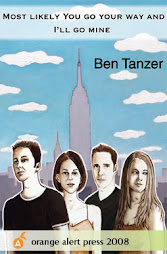

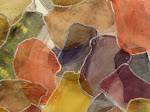









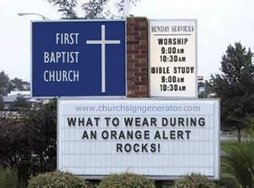
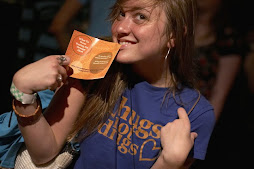




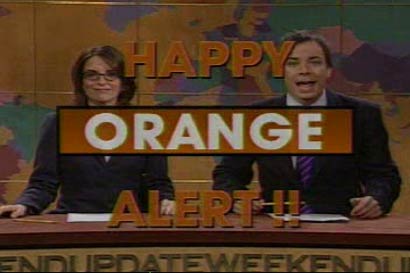


No comments:
Post a Comment